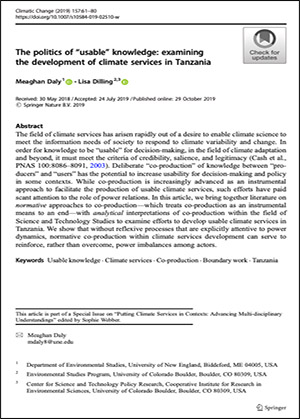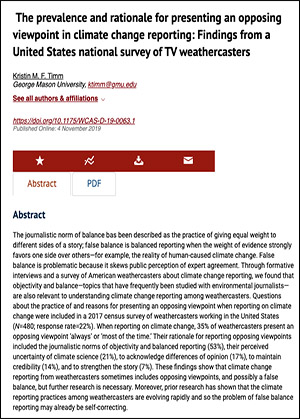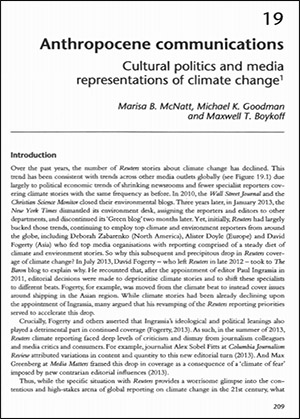CENTER Publications
Below is a sample of recent publications by CSTPR faculty (Center personnel highlighted):
|
 The Critical Role of Communities of Practice and Peer Learning in Scaling Hydroclimatic Information Adoption The Critical Role of Communities of Practice and Peer Learning in Scaling Hydroclimatic Information Adoption
Page, R. and L. Dilling, 2019. Weather, Climate, and Society, doi: 10.1175/WCAS-D-18-0130.1, Published September 24.
Abstract: Significant effort has been put into advancing the use and usability of information products to support adaptation to drought and climate variability, particularly for the water supply sector. Evidence and experience show that advancing the usability of information through processes such as coproduction is time consuming for both providers and users of information. One challenge for boundary organizations and researchers interested in enhancing the usability of their information is how such processes might “scale” to all the potential organizations and individual managers that might possibly be able to benefit from improved climate information. This paper examines information use preferences and practices specifically among managers of small water systems in the Upper Colorado River basin, with an eye toward identifying new opportunities to effectively scale information usability and uptake among all water managers—regardless of location or capacity—in a resource-constrained world. We find that boundary organizations and other usable science efforts would benefit from capitalizing on the communities of practice that bind water managers together. Specifically, strategic engagement with larger, well-respected water systems as early adopters, supporting dissemination of successes and experiences with new information products among a broader community of water managers, and increasing well-respected water systems’ capacity to engage directly with rural systems may all serve as useful strategies to promote widespread distribution, access, and adoption of information. Read more ... |
 Now or Never: How Media Coverage of the IPCC Special Report on 1.5C Shaped Climate-Action Deadlines Now or Never: How Media Coverage of the IPCC Special Report on 1.5C Shaped Climate-Action Deadlines
Boykoff, M. and O. Pearman, 2019. One Earth, doi: 10.1016/j.oneear.2019.10.026, Published November 22.
Abstract: Media coverage of climate change has increased since the Intergovernmental Panel on Climate Change (IPCC) Special Report on 1.5°C, and numerous articles cite 2030 “deadlines” for action. Such messaging can galvanize public engagement, but it might also prompt complex negative responses. As 2030 targets approach, more innovative, co-produced communication will be critical to engaging inclusive audiences. Read more ... |
 The 2019 Report of The Lancet Countdown on Health and Climate Change The 2019 Report of The Lancet Countdown on Health and Climate Change
Watts, N., M. Amann, N. Arnell, S. Ayeb-Karlsson, K. Belesova, M. Boykoff, O. Pearman, et al., 2019. The Lancet, doi: 10.1016/S0140-6736, Published November 13.
Executive Summary: The Lancet Countdown is an international, multidisciplinary collaboration, dedicated to monitoring the evolving health profile of climate change, and providing an independent assessment of the delivery of commitments made by governments worldwide under the Paris Agreement. The 2019 report presents an annual update of 41 indicators across five key domains: climate change impacts, exposures, and vulnerability; adaptation, planning, and resilience for health; mitigation actions and health co-benefits; economics and finance; and public and political engagement. The report represents the findings and consensus of 35 leading academic institutions and UN agencies from every continent. Each year, the methods and data that underpin the Lancet Countdown’s indicators are further developed and improved, with updates described at each stage of this report. The collaboration draws on the world-class expertise of climate scientists; ecologists; mathematicians; engineers; energy, food, and transport experts; economists; social and political scientists; public health professionals; and doctors, to generate the quality and diversity of data required. The science of climate change describes a range of possible futures, which are largely dependent on the degree of action or inaction in the face of a warming world. The policies implemented will have far-reaching effects in determining these eventualities, with the indicators tracked here monitoring both the present-day effects of climate change, as well as the worldwide response. Read more ... |
 Leave ‘em Laughing Instead of Crying: Climate Humor Can Break Down Barriers and Find Common Ground Leave ‘em Laughing Instead of Crying: Climate Humor Can Break Down Barriers and Find Common Ground
Boykoff, M., 2019. The Conversation, Published September 30.
Excerpt: Climate change is not inherently funny. Typically, the messengers are serious scientists describing how rising greenhouse gas emissions are harming the planet on land and at sea, or assessing what role it played in the latest wildfire or hurricane. Society may have reached a saturation point for such somber, gloomy and threatening science-centered discussions. This possibility is what inspires my recent work with colleague Beth Osnes to get messages out about climate change through comedy and humor. I have studied and practiced climate communication for about 20 years. My new book, “Creative (Climate) Communications,” integrates social science and humanities research and practices to connect people more effectively through issues they care about. Rather than “dumbing down” science for the public, this is a “smartening up” approach that has been shown to bring people together around a highly divisive topic. Read more ... |
 The Politics of ‘Usable’ Knowledge: Examining the Development of Climate Services in Tanzania The Politics of ‘Usable’ Knowledge: Examining the Development of Climate Services in Tanzania
Daly, M. and L. Dilling, 2019. Climatic Change, doi: 10.1007/s10584-019-02510-w, Published October 29.
Abstract: The field of climate services has arisen rapidly out of a desire to enable climate science to meet the information needs of society to respond to climate variability and change. In order for knowledge to be “usable” for decision-making, in the field of climate adaptation and beyond, it must meet the criteria of credibility, salience, and legitimacy (Cash et al., PNAS 100:8086–8091, 2003). Deliberate “co-production” of knowledge between “producers” and “users” has the potential to increase usability for decision-making and policy in some contexts. While co-production is increasingly advanced as an instrumental approach to facilitate the production of usable climate services, such efforts have paid scant attention to the role of power relations. In this article, we bring together literature on normative approaches to co-production—which treats co-production as an instrumental means to an end—with analytical interpretations of co-production within the field of Science and Technology Studies to examine efforts to develop usable climate services in Tanzania. We show that without reflexive processes that are explicitly attentive to power dynamics, normative co-production within climate services development can serve to reinforce, rather than overcome, power imbalances among actors. Read more ... |
 The Prevalence and Rationale for Presenting an Opposing Viewpoint in Climate Change Reporting: Findings From a United States National Survey of TV Weathercasters The Prevalence and Rationale for Presenting an Opposing Viewpoint in Climate Change Reporting: Findings From a United States National Survey of TV Weathercasters
Timm, K.M., E.W. Maibach, M. Boykoff, T.A. Myers, and M.A. Broeckelman-Post, 2019. Weather, Climate, and Society, doi: 10.1175/WCAS-D-19-0063.1, Published November 4.
Abstract: The journalistic norm of balance bas been described as the practice of giving equal weight to different sides of a story; false balance is balanced reporting when the weight of evidence strongly favors one side over others—for example, the reality of human-caused climate change. False balance is problematic because it skews public perception of expert agreement. Through formative interviews and a survey of American weathercasters about climate change reporting, we found that objectivity and balance—topics that have frequently been studied with environmental journalists—are also relevant to understanding climate change reporting among weathercasters. Questions about the practice of and reasons for presenting an opposing viewpoint when reporting on climate change were included in a 2017 census survey of weathercasters working in the United States (N=480; response rate=22%). When reporting on climate change, 35% of weathercasters present an opposing viewpoint ‘always’ or ‘most of the time.’ Their rationale for reporting opposing viewpoints included the journalistic norms of objectivity and balanced reporting (53%), their perceived uncertainty of climate science (21%), to acknowledge differences of opinion (17%), to maintain credibility (14%), and to strengthen the story (7%). These findings show that climate change reporting from weathercasters sometimes includes opposing viewpoints, and possibly a false balance, but further research is necessary. Moreover, prior research has shown that the climate reporting practices among weathercasters are evolving rapidly and so the problem of false balance reporting may already be self-correcting. Read more ... |
 Anthropocene Communications: Cultural Politics and Media Representations of Climate Change Anthropocene Communications: Cultural Politics and Media Representations of Climate Change
McNatt, M.B., M.K. Goodman and M.T. Boykoff, 2019. The Routledge Companion to Environmental Planning, S. Davoudi, R. Cowell, I. White, H. Blanco (eds.), Routledge.
Introduction: Over the past years, the number of Reuters stories about climate change has declined. This trend has been consistent with trends across other media outlets globally due largely to political economic trends of shrinking newsrooms and fewer specialist reporters covering climate stories with the same frequency as before. In 2010, the Wall Street Journal and the Christian Science Monitor closed their environmental blogs. Three years later, in January 2013, the New York Times dismantled its environment desk,_assigning the reporters and editors to other departments, and discontinued its ‘Green blog’ two months later. Yet, initially, Reuters had largely bucked those trends, continuing to employ top climate and environment reporters from around the globe, including Deborah Zabarenko (North America), Alister Doyle (Europe) and David Fogerty (Asia) who fed top media organisations with reporting comprised of a steady diet of climate and environment stories. So why this subsequent and precipitous drop in Reuters coverage of climate change? In July 2013, David Fogerty- who left Reuters in late 2012- took to The Baron blog to explain why. He recounted that, after the appointment of editor Paul Ingrassia in 2011, editorial decisions were made to deprioritise climate stories and to shift these specialists to different beats. Fogerty, for example, was moved from the climate beat to instead cover issues around shipping in the Asian region. While climate stories had been already declining upon the appointment of Ingrassia, many argued that his revamping of the Reuters reporting priorities served to accelerate this drop. Read more ... |
